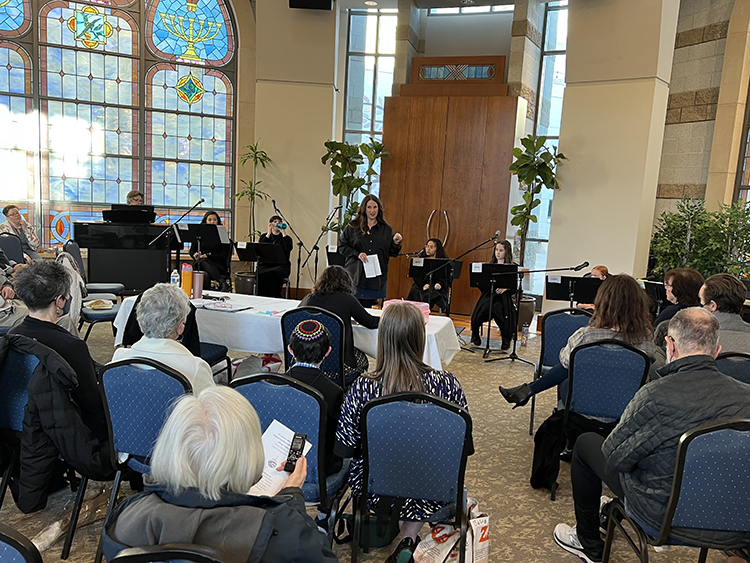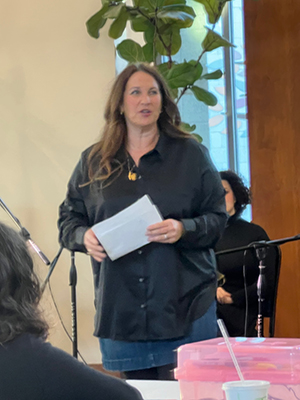
By Donald H. Harrison


SAN DIEGO – A new Jewish musical play, Hereville, was under construction Thursday night in the chapel at Congregation Beth Israel.
Produced and directed by Becky Cherlin Baird, the musical is still in its developmental stage: scenes are being rewritten, songs are being tested, audience reaction is being gauged. You might say that as a full-fledged stage production, Hereville is not thereville yet.
In Thursday night’s iteration, the musical involved seven girls and women, although the cast easily might be expanded because three of these actors had dual parts. “Hereville” is the name of a fictional Orthodox Jewish town located somewhere in the northeastern part of the United States (maybe near Monsey?), where Shabbat observance is the anchor and delight of every family.
However, all is not well in this blended family. Mirka (Sarina Turk), who is 11, misses her mother, who died two years before. She wears her mother’s torn sweater to keep her close. Although her sister Layele (Maya Gimbel), who is 7, has adjusted to her new family situation, Mirka cannot bring herself to think of her father’s new wife as anyone but Fruma (Celia Tedde). Unlike her sister, she doesn’t call Fruma “Mama,” she defiantly calls her “Fruma.” Rochel (Ezra Floersheimer), a 10-year-old who is Fruma’s own daughter, naturally calls Fruma “Mama,” so among the three girls, Mirka is the oldest yet is an outlier.
The relationship between Mirka and Fruma is symbolized by the game of chess that they play together. “How am I ever going to win if you keep taking my pieces?” Mirka demands of Fruma. Her patient stepmother responds, “Until we reach a checkmate, it’s anybody’s game.”
Before I go on with the plot (which may change), I need to say that all seven cast members sang beautifully, winning them throughout the 90-minute production sustained applause, not only from the relatives in the audience but also from the strangers including my wife Nancy and me. Two of the adults in the cast, Celia Tedde and Becca Myers (who played the witch) had been students of Baird’s, years ago when, then known as Becky Cherlin, she was the director of the J*Company based at the Lawrence Family JCC. Tedde today performs on stages in New York.
Did I say “witch?” Well, yes, and that’s when the musical takes an exciting and magical turn. On a Friday, before Shabbat, Mirka goes wandering in the nearby woods and spies a witch magically descending from a tree. (We had to imagine this part, because the cast read and sang their parts from their stationary places). The witch knows that Mirka has special powers because to most passersby, she and her tree are invisible. She tries to shoo Mirka away, but the 11-year-old is determined to learn some magic. Reluctantly, the witch, whose years of loneliness have made her quite cynical, agrees, while ruing the fact that another little girl, years before, had promised to be a loyal friend but had abandoned her.
Before Mirka returns home, we learn in a conversation between Fruma (formerly Franny) and her daughter Rochel that they are baalat teshuvah, that is they had recently become Orthodox, having in the past been non-observant. Rochel remembers the taste of burgers with bacon and cheese, but says her mother’s new found brisket is also geshmak (delicious!) On the other hand, Rochel misses here non-Orthodox friend, Hanna, who now lives in a different world. She also feels a little jealous of all the time her mother spends trying to win Mirka over.
Mirka arrives just in time for the Shabbat candle lighting. Following dinner and another chess game, she stays up “to read” while the rest of the family goes to bed. Then she surreptitiously returns to the witch’s house, where, as the result of some spilled magic potion, a meteor begins descending from the sky. Before it can land, Mirka, in a magical sequence, ascends to heaven and meets her Mama (Ariella Kvashny), who is wearing the sweater from which the earthbound Mirka had refused to part. Their meeting is brief, with the promise of another one the next day.
Meanwhile, Layele tells Fruma of a bad dream that she had, one in which her mother was wandering from place to place like a dybbuk. Fruma confides in Layele that she misses her own mother, for whom Rochel was named. Before they fall asleep, Fruma sings a lullaby to Layele in which Mama, unseen by either of them, also joins.
The meteor lands and by magic is transformed into a clone of Mirka named Mettie (Sophie Nevarez). At first, Mirka thinks this is a good thing because it will free up her time to learn more magic from the witch while Mettie fills her place in the family. But Mettie fills the place too well, learning at the speed of a comet every word in the dictionary. Also, importantly, she learns to love Fruma, even if she’s not Mirka’s real mom. Mettie urges Mirka to make the arrangement permanent and take her place as a meteor up in the heavens.
With the help of Layele and Rochel, Mirka decides she wants to stay right here in Hereville. She persuades Mettie to return to her own mother, which is a fiery rock in the sky. To accomplish this, Mirka, in the company of family members, returns to the witch. Spying Fruma, whom she knows as “Franny,” the witch decides she has an old score to settle. She turns her into a tree. Mirka grasps Fruma protectively, as she in tree form grows to the heavens. There, Mirka again meets her Mama and must decide if she would prefer to be with her in heaven or return to life back in Hereville.
Okay, that’s enough of the plot, which may further evolve anyway. Baird’s co-producer is the Lipinsky Family Jewish Arts Festival. Justin Gray is the music director and accompanist for this fascinating magical journey. Aliyah Thompson served as the assistant stage manager. Lizzie Hagstedt composed the music. Robby Sandler wrote the dialogue and lyrics based on graphic novels by Barry Deutsch. Ed and Sue Cherlin, Baird’s parents, were the sponsors of the evening, which I’m happy to say included bagels with shmear and rugelach. Speaking of parents, the daughters of Beth Israel’s Rabbis Jason Nevarez and Jeremy Gimbel both performed beautifully in this developmental cast!
The plot of the budding musical is quite complex, especially if you didn’t have the advantage of reading the script, which I did. The musical also runs a bit long. So, there will be trimming. Perhaps some scenes will be consolidated, others dropped. Who knows where the creative process may finally take it? It was a privilege to see a musical in this stage of its development. Someday, when it is fully developed and has its premier, the people who sat in Thursday night’s audience may say, with some pride, “I saw this musical in its infancy. I watched it grow!”
*
Donald H. Harrison is editor emeritus of San Diego Jewish World. He may be contacted via donald.harrison@sdjewishworld.com
Don, so beautifully written, Thanks so much for you review. Now I understand the story.
Happy you and Nancy were able to join us on this development road.